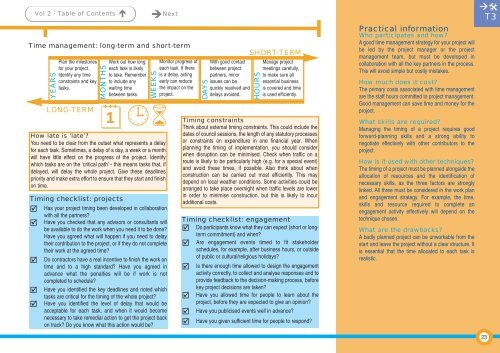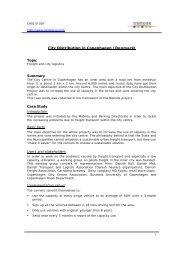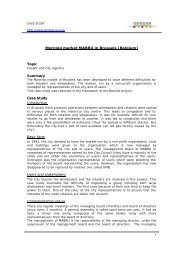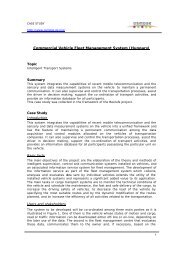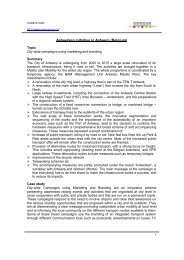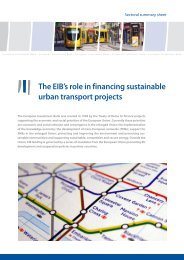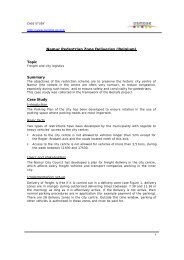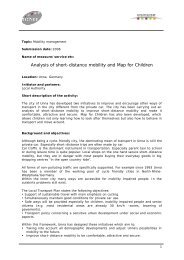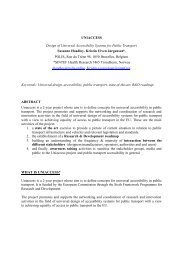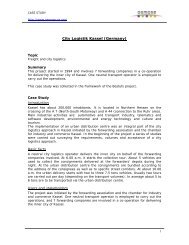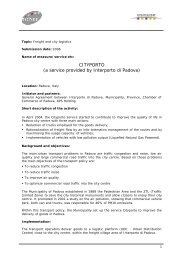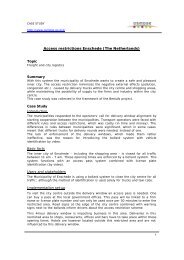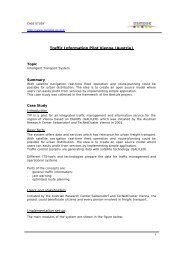Successful transport decision-making - Osmose
Successful transport decision-making - Osmose
Successful transport decision-making - Osmose
You also want an ePaper? Increase the reach of your titles
YUMPU automatically turns print PDFs into web optimized ePapers that Google loves.
Vol 2 - Table of Contents Next<br />
Time management: long-term and short-term<br />
SHORT-TERM<br />
Plan the milestones Work out how long Monitor progress of With good contact Manage project<br />
for your project. each task is likely each task. If there between project meetings carefully,<br />
Identify any time to take. Remember is a delay, acting partners, minor to make sure all<br />
constraints and key to include any early can reduce issues can be<br />
essential business<br />
tasks.<br />
waiting time<br />
the impact on the quickly resolved and is covered and time<br />
between tasks. project.<br />
delays avoided. is used efficiently.<br />
LONG-TERM<br />
<br />
Timing constraints<br />
Think about external timing constraints. This could include the<br />
How late is ‘late’?<br />
dates of council sessions, the length of any statutory processes<br />
You need to be clear from the outset what represents a delay or constraints on expenditure in one financial year. When<br />
for each task. Sometimes, a delay of a day, a week or a month<br />
planning the timing of implementation, you should consider<br />
will have little effect on the progress of the project. Identify<br />
when disruption can be minimised. Check when traffic on a<br />
route is likely to be particularly high (e.g. for a special event)<br />
which tasks are on the ‘critical path’ - this means tasks that, if<br />
and avoid these times, if possible. Also think about when<br />
delayed, will delay the whole project. Give these deadlines<br />
construction can be carried out most efficiently. This may<br />
priority and make extra effort to ensure that they start and finish<br />
depend on local weather conditions. Some activities could be<br />
on time.<br />
arranged to take place overnight when traffic levels are lower<br />
in order to minimise construction, but this is likely to incur<br />
Timing checklist: projects<br />
additional costs.<br />
Has your project timing been developed in collaboration<br />
with all the partners?<br />
Timing checklist: engagement<br />
Have you checked that any advisors or consultants will<br />
be available to do the work when you need it to be done? Do participants know what they can expect (short or longterm<br />
commitment) and when?<br />
Have you agreed what will happen if you need to delay<br />
their contribution to the project, or if they do not complete Are engagement events timed to fit stakeholder<br />
their work at the agreed time?<br />
schedules, for example, after business hours, or outside<br />
of public or cultural/religious holidays?<br />
<br />
<br />
<br />
YEARS<br />
MONTHS<br />
WEEKS<br />
Do contractors have a real incentive to finish the work on<br />
time and to a high standard? Have you agreed in<br />
advance what the penalties will be if work is not<br />
completed to schedule?<br />
Have you identified the key deadlines and noted which<br />
tasks are critical for the timing of the whole project?<br />
Have you identified the level of delay that would be<br />
acceptable for each task, and when it would become<br />
necessary to take remedial action to get the project back<br />
on track? Do you know what this action would be?<br />
<br />
<br />
<br />
<br />
DAYS<br />
HOURS<br />
Is there enough time allowed to design the engagement<br />
activity correctly, to collect and analyse responses and to<br />
provide feedback to the <strong>decision</strong>-<strong>making</strong> process, before<br />
key project <strong>decision</strong>s are taken?<br />
Have you allowed time for people to learn about the<br />
project, before they are expected to give an opinion?<br />
Have you publicised events well in advance?<br />
Have you given sufficient time for people to respond?<br />
Practical information<br />
Who participates and how?<br />
A good time management strategy for your project will<br />
be led by the project manager or the project<br />
management team, but must be developed in<br />
collaboration with all the key partners in the process.<br />
This will avoid simple but costly mistakes.<br />
How much does it cost?<br />
The primary costs associated with time management<br />
are the staff hours committed to project management.<br />
Good management can save time and money for the<br />
project.<br />
What skills are required?<br />
Managing the timing of a project requires good<br />
forward-planning skills and a strong ability to<br />
negotiate effectively with other contributors to the<br />
project.<br />
How is it used with other techniques?<br />
The timing of a project must be planned alongside the<br />
allocation of resources and the identification of<br />
necessary skills, as the three factors are strongly<br />
linked. All three must be considered in the work plan<br />
and engagement strategy. For example, the time,<br />
skills and resource required to complete an<br />
engagement activity effectively will depend on the<br />
technique chosen.<br />
What are the drawbacks?<br />
A badly planned project can be unworkable from the<br />
start and leave the project without a clear structure. It<br />
is essential that the time allocated to each task is<br />
realistic.<br />
<br />
T3<br />
23


